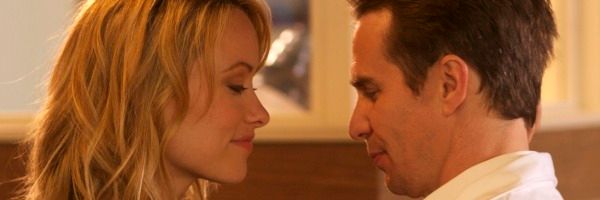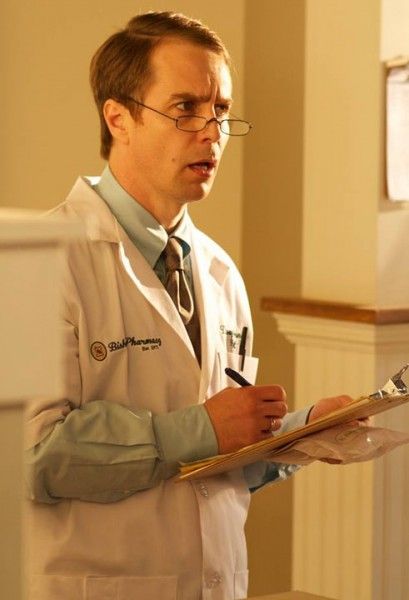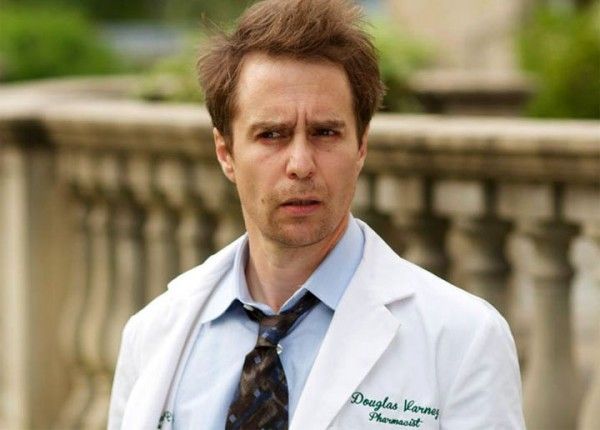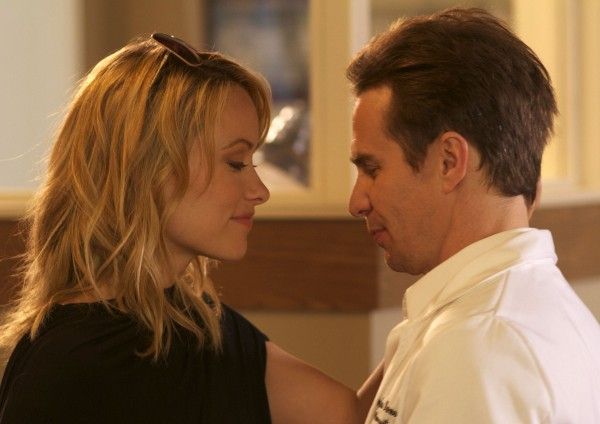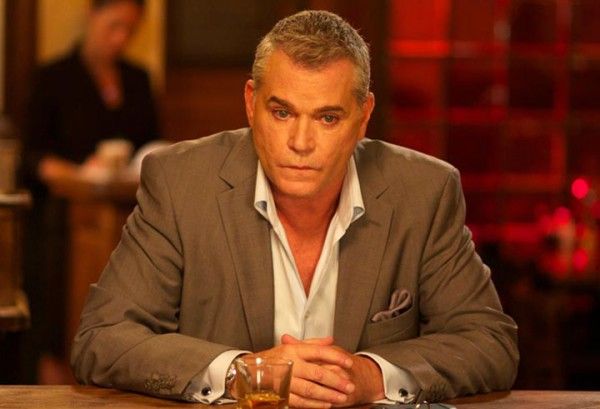Written and directed by Geoff Moore and David Posamentier, the indie dramedy Better Living Through Chemistry tells the story of Doug Varney (Sam Rockwell), a small town pharmacist whose uneventful life is turned upside down when he starts an affair with a trophy wife customer (Olivia Wilde) who takes him on a joyride involving sex, drugs and murder.
During this exclusive phone interview with Collider, Geoff Moore and David Posamentier talked about the journey they took to get to their current career as writer/directors, how they came to their partnership, deciding whether or not to go ahead with Better Living Through Chemistry after the casting fell apart, what inspired the film’s story, finding the right balance between comedy and drama, collaborating with their cast of actors, and deciding what it is they want to do next. Check out what they had to say after the jump.
Collider: You guys each took a journey, before getting to where you are now? At what point did you decide that you wanted to be storytellers?
GEOFF MOORE: We were both development executives and we both worked on the other side of the desk. For me, personally, I didn’t grow up thinking, “Oh, I have to be a writer,” or “Oh, I have to work in the movie business.” Nobody in my family had any sort of connections to that. My family is all from Texas, it’s definitely a storytelling family, just in the sit around and tell stories about our crazy relatives kind of way. And my dad happened to be particularly gifted, in that area. So, working on the production side and development side, I realized it was just telling stories, in a different form, and that maybe I should give it a go. That happened to be right around the time that Dave and I met each other.
DAVID POSAMENTIER: I certainly got bit with the bug a little bit earlier. In high school, my school offered a very low-tech video production course. They gave us camcorders and we’d go out and make these crazy videos, and I just thought it was the best. I was a really poor student, and it was the only thing that I excelled in. So, it was a combination of having a very cool, progressive teacher that was showing us all the movies from the arty section of the video store that you didn’t go to until a certain age, and then having a taste of success with something at school. That got me going. From that point on, I knew I wanted to be doing something in TV and film. And then, Geoff and I met each other and started writing, and here we are.
How did you even know that you’d be able to work together as writers without killing each other?
POSAMENTIER: We were both each working at production companies. What’s benefitted our writing partnership was that we weren’t college roommates and we were old high school pals. We just met each other through work, and we knew we had a similar sensibility and made each other laugh a lot, but our partnership was just based on the work. We were like, “Let’s try to write a script together.” “Okay, sure.’ We didn’t know each other that well. We just knew we wanted to try writing together. So, here’s this person you’re beholden to now, and if I don’t hold up my end of the work, I’m letting this guy down. Everything was built around the writing first. We had a good chemistry working together, and we just evolved into close friends, over the years. That’s been really beneficial to the partnership.
Did you try writing something together to test out your partnership, or did you immediately write things that you were going to try to sell?
MOORE: That’s actually a really interesting question. We still worked at our jobs. We were still going to our offices, every day. And then, we hatched this plan that was like, “Let’s try to write ourselves out of our jobs.” We sat down and went through an exercise of asking, “What are some of your favorite movies? Who are some of your favorite screenwriters? Directors? Actors? Who are the people you would want to write a movie for?” We reached a point where we were like, “Okay, let’s be smart about this. Let’s put our institutional knowledge to use. We should write a big, splashy, action-thriller.” This was 10 years ago, so there still was a fairly viable spec market and we decided to do that. We had an idea that we liked, and we started it, in service of a goal. Along the way, we had this nugget of an idea that became the first script we actually wrote. It was about as far away from a spec that you can get. It was a small, character-focused comedy where the lead was 70 years old. So, we knew we were never going to sell it for a dollar, let alone a million dollars, but it was what we were passionate about. It established our voice and it let us be constant in the story we were telling. We’ve still never made one dollar off of that script, but that got us an agent and a manager. And as a sample, it got us our first job. So, it’s served its purpose, a thousand times over. It will always have a special place in our hearts because it was the first one and it got things going. But it was the anti-spec, in a lot of ways.
POSAMENTIER: There is no real hard and fast advice that you can give people, on careers in entertainment. There’s just no rule book on what’s going to work and what’s not going to work. But when younger writers ask us, “What should I be writing?,” we look to our own experience of not trying to write something you think people will like. You have to write something that makes you happy and is emblematic of your voice. And then, good things will happen because someone is going to respond to who you are and what your voice is. Over the last 10 years of working together, we’ve done really good work, but the streets are full of people that can tell stories the same as ours, where we’ve had movies greenlit, and then the studio president gets fired the next day. We’ve had so many ups and downs and near misses. All you can control is writing a great script, and then something insane happens and your project doesn’t go forward. So, two people who have had their hearts broken a number of times, just decided to exert a little more control over the fate of what this project is going to be. If it goes downhill, we’ve done as much as we could, in our own power to make it happen.
You were all set to go with this film, with Jeremy Renner and Jennifer Garner as your leads, and then that fell apart and you had to recast the film. Were you just always so focused on getting this film made that you just regrouped and kept at it, or did you need to decide if you really wanted to keep pursuing this film?
POSAMENTIER: That’s another great question. We had them attached and were ready to go, and then Jeremy went and became a massive star, and Jennifer got pregnant. We were actually on a location scout in Baltimore, where we ended up shooting the movie, and we were at the hotel bar, licking our wounds, as we got the news that Jeremy was going to fall out. We told each other, “Okay, we are certainly getting people calling us, who could help us get this movie made, but aren’t necessarily right for the movie, as far as financing goes. But, let’s go back to Los Angeles and give it one last whirl, and see if we can cast this movie the right way and make it the right way. If we can’t, let’s not compromise on our vision and just jam anyone in to make the movie. We’ll just shelve it and start again with a different one.” We were fortunate enough to have Sam Rockwell step in and be incredible, and the same with Olivia Wilde. But we certainly did come up to a crossroads where we found ourselves going, “We’re either going to do this our way or no way.”
When you sat down to write this script, where did it start? Was there something specific that had inspired a character, or was it this particular story?
MOORE: It definitely started with a character, and then it expanded from there. Dave and I had an office in deepest, darkest Hollywood, and there was a Rite Aid pharmacy near our office, where we would sometimes stuff after lunch to get a bottle of water. We went in one afternoon and came out, and we really both had the same observation that the pharmacist, who’s theoretically king of that castle, just looked like he was having the worst year of his life, all in one day. From there, we just started playing the “what if” game. What if he lived in a small town? Dave and I both grew up in small towns, like what’s in the movie. The dad of my next door neighbor, growing up, was a pharmacist at the only pharmacy in town. The more we talked about it, the more we were like, “This pharmacist knows a lot about a lot of people that he also socializes with.” Talk about great power and great responsibility. It’s an interesting scenario. And then, it became about, what if you put that guy into this hen-pecked relationship where he’s dominated by everybody? And then, he meets this woman and there’s a murder plot. We had the character of Doug first, which is very common for our process. And then, it was a matter of getting him into a spot where we didn’t know how he would get out. In the scriptwriting process, we blazed through the first 70 pages, about as fast as we’ve ever written anything, and then we hit this point where we were like, “Okay, now what? Where do we go from there?” We went through every iteration of a third act, until we hit on what ended up being in the movie.
POSAMENTIER: It was far from any sort of message movie, but we thought there was something interesting in a guy who isn’t really a doctor, isn’t really a scientist, and is seen as the help.
A film like this has the delicate balance between comedy and drama, without one over-shadowing the other. Is that a challenging balance to find, and does that really have to get shaped during the editing process?
POSAMENTIER: It’s extraordinarily difficult. This script had a far darker tone, and there was even more biting, caustic humor in it. While there was stuff that we shot that was absolutely hysterical on the day, as we started to shape the cut, some moments that were absolutely hilarious were almost detours from the story, taking a brief exit from the flow of the movie to service a gag. It took restraint to not put it in, and you realized the benefits. So, shaping the tone was certainly something that was a delicate balance that we fielded over the course of post. Getting the score right was also a huge part of it.
What was it like to collaborate with and direct this cast of actors, once you had them together?
MOORE: Particularly as first-time filmmakers, David and I talked about how lucky we got with this ensemble. In a weird way, it makes you nervous about the next one because you wonder, “What if we used up all of our good luck, this time?” This cast was on location in Maryland, nobody was getting paid anything and nobody was getting any perks, but they showed up prepared, gung-ho, committed, ready to work and ready to play with the roles a little bit. We gave them as much freedom as we could give them, in a 25-day shoot. It really was a pretty outstanding experience. And on top of giving great performances, they were all genuinely decent people. It was fantastic. We really can’t say enough about anyone that was a part of this.
POSAMENTIER: There’s that, “Holy shit!,” moment you have, when you step back from it while you’re actually directing the film. You’re on set and you’re finishing up for the day, and you’re like, “Wow, I can’t believe Ray Liotta was listening to what I had to say, and looking to me for direction on how to interpret a scene. I can’t believe Sam Rockwell was jotting down notes I had on a scene in his script.” We were fortunate to have a lot of other writers and directors, who are our friends, that gave us sage advice going into it, and they all said the same thing. It doesn’t matter if it’s Tom Cruise or Sam Rockwell or a first-timer, actors want direction. They’re there because they want direction. There’s a script and you’re helping to interpret that script, and they’re looking to you. That’s their job. It’s such an amazing moment when you realize that this amazing cast that’s gathered around is there because of what you were trying to say. That’s pretty cool.
Were you extra nervous about working with Jane Fonda?
MOORE: I guess there were nerves. She came for a half-day to a day of work, and she was probably the most exuberant of everybody that was there. She was such a delight and so enthusiastic. The pharmacy location was an old empty department store, right on the main drag of Anapolis. She just walked down the street and poked her head into all of the little shops nearby. It wasn’t nerves as much as watching and thinking, “Oh, this is a true grand dame movie star.” You felt this presence. As opposed to nerve-inducing, it was more like, “Okay, I get it now. I get that thing.”
POSAMENTIER: I agree. I think it took until after we wrapped and you get perspective on it. You don’t have time to diddle away on the internet looking at stuff, but then you look up Jane Fonda’s career and you’re like, “Good god, she’s done everything.” We had to go up to her house for some brief ADR and we were waiting in her living room, and I was like, “Oh, wow, she has Warhol’s of herself. Holy shit! She has original Warhol’s of herself from 1982. That’s kind of a big deal.” It took a few months to set in before we realized that we’d come in contact with a legend.
When you finished shooting this, after having taken such a journey to finally get the film done, did you immediately want to figure out what the next film would be, or did you want to take a break?
POSAMENTIER: It’s a combination of the two. We are walking softly. As writers, we feel fortunate that we can create our own content, and we’re always working on new ideas. There has been a small cluster of people in the industry who have seen the movie and responded favorably, so we’re getting sent some scripts to direct. So, we’re approaching it carefully. We’ve gotten advice from everyone from our D.P. to other directors, who all say the same thing, which is that your second movie is almost more important than your first movie. We’re being very selective about what the next opportunity is, and we’re enjoying this run, up to the release. We’ll take it from there, after a wider audience gets to see this film, and see what opportunities are out there.
So, you’re also considering things that other people have written, and not just your own scripts?
MOORE: I think it’s probably too much of a calculated plan to give us credit for something like that. We’re certainly open to that. There are writers who have made the transition to directing that we really admire, like John Requa and Glenn Ficarra, who wrote Bad Santa, and then they wrote and directed I Love You Phillip Morris, and then they directed Crazy, Stupid, Love at a studio. They didn’t write that, but it was a great opportunity. One of the take-aways from Better Living was how much we enjoyed it and how well it worked. We came out of it hungry to do it again.
POSAMENTIER: Oddly enough, it took directing a movie to make me feel more empowered, as a writer. It’s nice to know that we can get sent scripts, and we’re excited to read scripts and explore projects from other writers. And it’s nice to know that we can just go back to the computer and crank out something else.
Better Living Through Chemistry is now playing in theaters.

